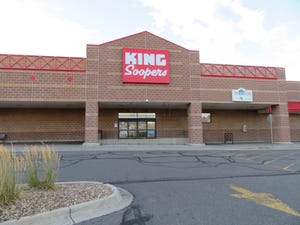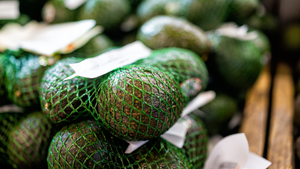ORGANIC GROWTH 1994ORGANIC GROWTH 1994
ATLANTA -- Organic produce, long thought a lackluster category, is starting to shine in supermarket produce departments.Retailers say they don't expect organics to become a dominant player in the department, but do see considerable growth potential in the years ahead, provided concerns about spotty or limited supply can be overcome."I don't think that organics will ever dominate the fresh produce
October 24, 1994
TONY SPLEEN
ATLANTA -- Organic produce, long thought a lackluster category, is starting to shine in supermarket produce departments.
Retailers say they don't expect organics to become a dominant player in the department, but do see considerable growth potential in the years ahead, provided concerns about spotty or limited supply can be overcome.
"I don't think that organics will ever dominate the fresh produce industry," said Horace Hamilton, produce merchandiser for the Atlanta division of Kroger Co., Cincinnati. "I do think they will be a significant piece of the industry and maybe even more significant in the future than we think. We sell more than I thought we ever would."
Hamilton's comments echoed those of several other retailers who were interviewed about organics on a recent tour of the Atlanta market sponsored by the Produce Marketing Association, Newark, Del.
Industry reports put total U.S. sales of organic produce and processed foods at $1.9 billion in 1993, the second year in a row that sales increased more than 23%. Supermarkets represent probably only a small -- yet growing -- fraction of that total, say industry experts.
While very little research has been done to track organics in supermarkets specifically, that might be changing. According to the Food Marketing Institute, Washington, its members are growing increasingly interested in the organic and natural foods category. For many years, most produce retailers thought organic produce only appealed to a small segment of consumers. According to a recent consumer study commissioned by Emmaus, Pa.-based Rodale Press, publisher of Prevention Magazine, nearly one out of every three shoppers says he or she has changed eating habits or has sought out organically grown produce in the past year due to reports on pesticide and chemical use.
"I think that most customers are not terribly concerned about whether the produce we sell is organic or not," said Hamilton of Kroger. "Those customers who care, however, care a great deal. They are concerned about pesticides. They will make a store shopping decision based on whether or not they can buy organic produce."
The Atlanta market has a customer base that will increasingly demand organic produce, said Brian Baker, technical coordinator for California Certified Organic Farmers, Santa Cruz, Calif. The group establishes standards for organic produce and certifies the state's organic farmers, who produce the majority of organics sold in the United States.
"Demographically, Atlanta is like San Francisco and cities in the Northeast," he said. "It's fairly sophisticated with highly educated, professional consumers. They have a good disposable income, and many are willing to pay a premium for organic produce because they are worried about pesticide residues."
Kroger's Hamilton agreed.
"Our customers talk to us a lot about pesticides," he said. "They are concerned. Some are concerned enough that they will buy only organics. That's why we carry them."
While organics are available in most Kroger stores in the Atlanta division, they get unique treatment at the 83,000-square-foot store visited by SN, said Hamilton.
Organics occupy a separate 16-foot section of refrigerated display cases immediately inside the main entrance of the store. The department carries about 25 different items.
Hamilton said the store has been experimenting with organics for about a year and a half. Although organics are more successful than he "ever anticipated them to be," he said it is too early to predict to what degree the rest of the company will expand the category in the future.
"We're the only Kroger division doing anything significant with organics right now," Hamilton said.
He declined to say specifically how large a percentage of produce sales organics represent or exactly how much organics sales have grown. But he did say that, with rising consumer demand, the company is becoming more committed to organics.
"We're not here saying the industry ought to go totally organic," he said. "And we're not here to make choices for our customers. We're here to offer them a choice."
It was a desire to expand consumers' choices that prompted Dekalb Farmers Market, another Atlanta retailer, to do away with its separate organics section and integrate organic items with their conventionally grown counterparts.
The change was instituted in the retailer's 140,000-square-foot store last spring and has resulted in the doubling of organics sales to 15% of the total department, according to Dekalb's president, Robert Blazer.
"We're emphasizing organics more," said Blazer, who pointed out that of the 580 items offered in the massive produce department 90 are organic.
"We used to have a separate organics section and now we're putting it next to the other items to give people the choice. That's a big step forward," he said.
Despite what some view as an optimistic outlook for organics, some retailers say that two factors are keeping the category from reaching its full potential: premium prices and inconsistent supplies.
Lakeland, Fla.-based Publix is having a tough time selling its limited variety of organic produce items in its six stores in the Atlanta area.
"We're not moving as much as I'd like, but there is definitely a demand," said a produce department associate, who asked not to be identified. "Organics aren't as popular as they could be because the price is too high."
An industry observer familiar with the market area said Publix probably isn't successful with organics because the company prices organic produce too high and doesn't promote it or give it enough visibility.
"People will pay a premium for organics, but only so much," said the source, who asked not to be identified. "They definitely won't pay a premium for something that is just shoved in a corner and isn't given adequate promotion."
While visiting the Publix store in Shallowford, Ga., SN noted that only eight organic items were available and their prices generally ran more than double that of the same conventionally grown items. A one-pound bag of organic carrots, for example, was priced at 99 cents, while the same size bag of conventionally grown carrots was selling for 39 cents.
At both Kroger and Dekalb, prices for most organics were slightly higher than for their conventional offerings, but the price spread generally ran within 20%.
At Kroger, for example, a two-pound bag of organic carrots was $1.39, while the same size bag of conventionally grown carrots was $1.19. Organic red leaf lettuce was priced at $1.29 each, while regular red leaf was $1.19. And romaine lettuce -- both organic and conventional -- was priced at $1.19.
At Dekalb, organic lemons were three for 99 cents, while conventionally grown lemons were four for 99 cents. Neither Dekalb's Blazer nor Kroger's Hamilton would comment on their margins or if they take a loss because of their pricing.
Retailers like Dekalb and Kroger must be using the right pricing formula in order to move organic produce and still make a profit, said Baker of the California Certified Organic Farmers.
Organic produce is still a specialty item, typically grown by small farmers who incur higher costs relative to large conventional produce growers, he said. As a result, the price to the retailer for organic produce is typically about 20% higher than conventional produce.
"The consensus is that consumers seem to be willing to pay a 20% premium for organic produce," he said. "Unfortunately, many retailers jack up the price 50% or 100% and customers walk."
He said retailers, while perhaps not making the same margins they do on other items, could charge less than they are for organics and still make a profit.
Some Atlanta retailers said they would like to do more with organics, but they can't always rely on the products being delivered once they're ordered.
"We commit the space to it, then never get it," said Dennis Young, regional training manager for Harris Teeter, Charlotte, N.C. "We might not get five of the 28 items that we order.
"Right now organics are hot," he said. "We've had a tremendous demand for it. Our challenge is to be in stock more readily for our clientele."
He said the company is looking for more reliable sources of products so it can meet demand.
In the company's first store to open in this market, organics are given a six-foot section. Young said Harris Teeter would like to double that.
"We could easily give it 12 to 15 feet," he said. "But with the inconsistent availability of product, you're always jostling with that. I don't think we've done a good enough job meeting the customers' needs in organics."
The Atlanta division of Cub Foods, Stillwater, Minn., has had the same experience.
"We've been in and out of organics for the last five years," said Cub's produce director, Ken Lanhardt, who said the division isn't now selling organics.
"Usually with organics you get in and then get out or you can't get in because you're at the mercy of whoever is selling organics as to whether you get the product or not," Lanhardt said. Despite inconsistent supply, however, Lanhardt said he will probably get back into organics because demand is up.
"I think we'll be back into it with a six- or eight-foot section in the back of the department," he said. "We need it because customers are asking for it more and more."
Baker of the California Certified Organic Farmers said he was surprised to hear that some Atlanta retailers have a difficult time finding consistent supplies.
He said the growth in organic production has been "explosive" in the last five years. More than 50,000 acres of organically grown produce are in production in California today, he said, compared with 16,000 in 1989.
"We have plenty of supplies," he said. "Our growers tell us they can't sell all their product and have actually pulled some acres out of production as a result."
About the Author
You May Also Like




